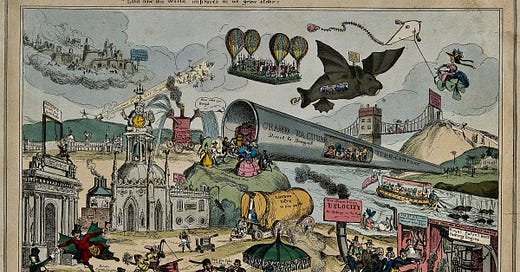What did the future look like in 1820s Britain? Poking fun at liberal ambitions for education reform, the rapid pace of industrialization, and a fashionable interest in applied knowledge, William Heath’s March of Intellect series offered a satirical vision of the wonders and potential cost of progress. While extravagantly dressed ladies window-shop for pastel finery and forgo stairwells in favor of belt-driven slides, a child is moments away from being paved into the road by a carriage at full gallop. The automation of domestic labor — through a device called the “Grand Servant Superseding Apparatus for doing every kind of household work &c &c &c &c” — leaves women more time for recreation (or idle folly): smoking shisha in public, riding horsy hovercrafts, and traveling effortlessly to South America, Bengal, and Cape Town through the use of vacuum tubes, accelerator bridges, and pedestrian tunnels. Men gorge themselves on pineapples and guzzle bottles at the Champagne Depot. Postmen flit around with winged capes; a clocked-in shoeshiner has the time to read a newspaper in French, thanks to his boot-cleaning engine. Even convicts have it better: they embark for New South Wales on a gargoyle zeppelin, but still have panoramic views. ~ “March of Intellect” Cartoons (1828–29)
Rapid transport: passengers travel on a model horse driven by steam; a postman equipped with wings travels by air; a steam-powered waggon travels between Bath and London in six hours; a pneumatic tube takes passengers from Greenwich Hill to Bengal; there is a suspension bridge between Bengal and Cape Town; a giant flying fish takes convicts from England to New South Wales; Irish emigrants are fired from a cannon; etc.
Mechanization: boot-polishing and shaving are powered by steam; bodies are lifted by crane up on the roof of a church for burial in order to foil body-snatchers
Sophisticated tastes among the masses: dustmen eat icecream and pineapples; cat's meat is called "delicate viands for quadrupeds"; a street-vendor sits under a tasselled parasol reading fiction. A tombstone marking the grave of the "Select Vestry" is decorated with dining implements, implying that the introduction of local government elections will stop aldermen etc. from extravagant dining at public expense
Extravagant building projects: Marble Arch and Buckingham Palace; a church with Chinese, Indian and Gothic features; literally building castles in the air to pay off the national debt
Publication/Creation: London (26 Haymarket) : Thos. McLean, [ca. May 1829]
Physical description: 1 print : etching, with watercolour ; image 28.6 x 40.4 cm
Contributors: William Heath, 1795-1840.
Lettering: March of intellect. "Lord how this world improves as we grow older." [Paul Pry] Esq.re del.
Creator/production credits: By William Heath using the pseudonym Paul Pry, represented by a vignette of Paul Pry
References note: British Museum, Catalogue of political and personal satires, vol. XI, London 1954, no. 15779
Lettering note: The "March of intellect" or "March of mind" was a popular phrase in the 1820s and 1830s, used seriously by some, mockingly by others, to denote trust in mass education and technological progress to solve the problems of society: see Wikipedia
"Lord how this world improves as we grow older." This is a heavily ironic quotation from the poem The knight and the friar (ca. 1800) by George Colman the younger (1762-1836): "The Lady wrote just what Sir Thomas told her; For, it is no less strange than true, That wives did, once, what husbands bid them do;– Lord! how this world improves, as we grow older!"
Reference: Wellcome Library no. 37252i




